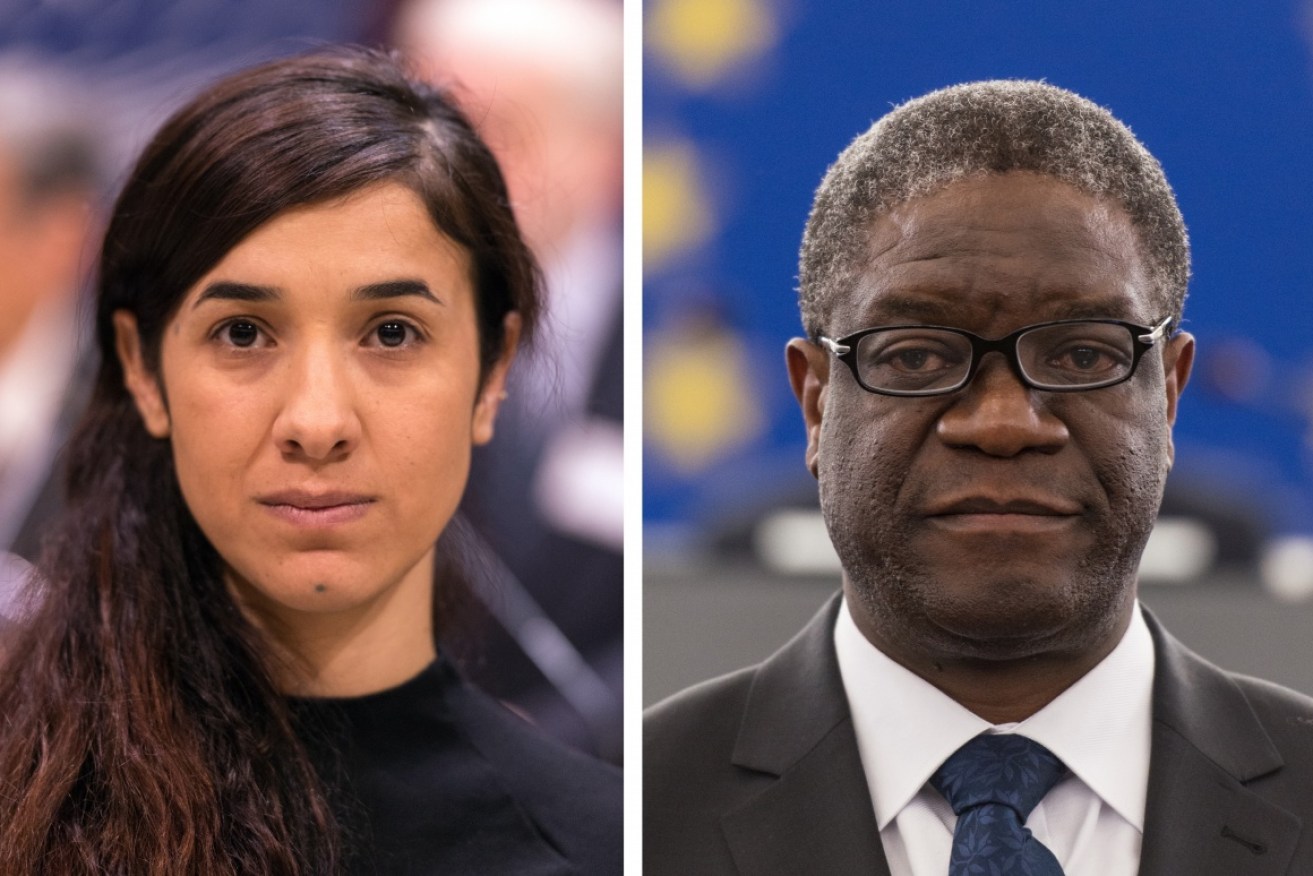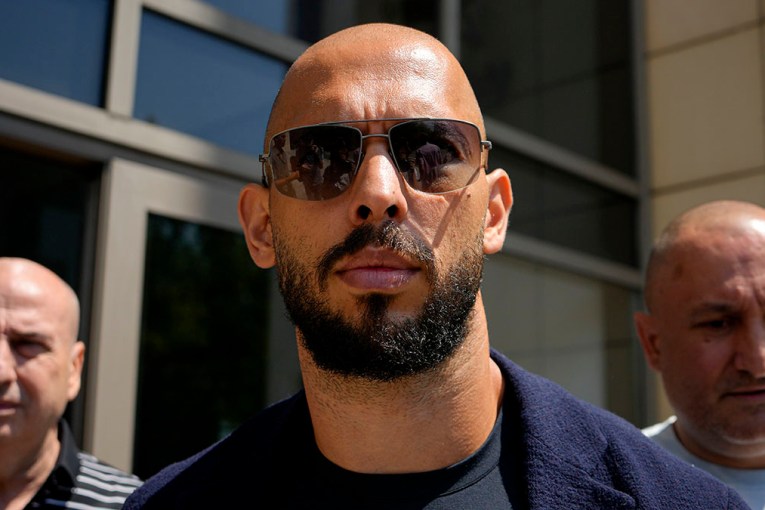DRC doctor and a former IS captive win peace prize for efforts to end sexual violence in war

Nadia Murad and Dr Denis Mukwebe put their personal safety at risk, the committee said. Photo: AAP
Physician Denis Mukwege and former captive of the Islamic State (IS) group Nadia Murad have won the 2018 Nobel Peace Prize for their efforts to end the use of sexual violence as a weapon of war.
Gynaecologist Dr Mukwege has spent large parts of his adult life helping thousands of victims of such violence in the Democratic Republic of Congo, which the United Nations has called “the rape capital of the world”.
“The importance of Dr Mukwege’s enduring, dedicated and selfless efforts in this field cannot be overstated,” the Nobel committee said.
“He has repeatedly condemned impunity for mass rape and criticised the Congolese Government and other countries for not doing enough to stop the use of sexual violence against women as a strategy and weapon of war.”
The committee called him the “foremost, most unifying symbol” of the struggle to end sexual violence in war.
Denis Mukwege’s basic principle is that “justice is everyone’s business”. The 2018 Peace Laureate is the foremost, most unifying symbol, both nationally and internationally, of the struggle to end sexual violence in war and armed conflicts. @DenisMukwege#NobelPrize pic.twitter.com/KSzecKSkUc
— The Nobel Prize (@NobelPrize) October 5, 2018
Ms Murad was abducted by Islamic State militants along with thousands of other Yazidi women and girls after the Iraqi area of Sinjar fell in August 2014.
In December 2015, she told the United Nations Security Council how she was held captive for three months and sold repeatedly for sex before escaping with the help of a Muslim family in Mosul.
A year after most IS-held areas were retaken by Iraqi security forces, about 3000 Yazidi women and girls are still missing, most presumed dead.
Ms Murad was named the United Nations’ first Goodwill Ambassador for the Dignity of Survivors of Human Trafficking in 2016, at the age of 23.
In 2017, she published a memoir of her ordeal, The Last Girl, in which she recounted in harrowing detail her months in captivity, her escape and her journey to activism.
“At some point, there was rape and nothing else. This becomes your normal day,” she wrote.
Nadia Murad, awarded the 2018 Nobel Peace Prize, is the witness who tells of the abuses perpetrated against herself and others. She has shown uncommon courage in recounting her own sufferings and speaking up on behalf of other victims.#NobelPrize pic.twitter.com/NeF70ig09J
— The Nobel Prize (@NobelPrize) October 5, 2018
The militants’ attack on Yazidi communities in northern Iraq was part of what the United Nations has called a genocidal campaign launched by the Sunni militants against the religious minority.
“[Ms Murad] has shown uncommon courage in recounting her own sufferings and speaking up on behalf of other victims,” the committee said.
Ms Murad is the second-youngest winner of a Nobel Prize after Malala Yousafzai, who won the Peace Prize in 2014.
In making the announcement, committee chairwoman Berit Reiss-Andersen said: “Both laureates have made a crucial contribution to focusing attention on and combatting such war crimes.”
She said both laureates had put their personal security at stake as activists on the issue.
In 2012, armed men tried to kill Dr Mukwege, forcing him to temporarily leave Congo.
The award of the prize follows a year in which the abuse and mistreatment of women in all walks of life across the globe has been a focus of attention.
Asked whether the #metoo movement, a prominent women’s rights campaign, was an inspiration for this year’s prize, Ms Reiss-Andersen said: “Metoo and war crimes are not quite the same.”
“But they have in common that they see the suffering of women, the abuse of women and that it is important that women leave the concept of shame behind and speak up.”
Praise for laureates
“She’s crying right now. She’s crying, she can’t talk,” Ms Murad’s brother told Norwegian public broadcaster NRK after the award was announced.
Dr Mukwege was in surgery when he heard about the award, and was “proud, he was very humbled, and of course excited,” a spokesman for the Dr Denis Mukwege Foundation said.
“At the same time he realises that this brings even more responsibility than he already felt for this cause.”
Iraq interrupted normal television programming to broadcast the announcement, and Iraqi Prime Minister Haider al-Abadi released a statement congratulating her.
Vian Dakhil, a Yazidi member of the Iraqi parliament, tweeted: “A thousand congratulations to Nadia Murad for winning the Nobel prize. It is the victory of good and peace over the forces of darkness.”
The Iraqi Government and the US-led coalition in Iraq also tweeted their congratulations.
Michelle Bachelet, the United Nations high commissioner for human rights, said: “It is hard to imagine two more worthy winners of the Nobel Peace Prize than Nadia Murad and Denis Mukwege.”
“This is a richly deserved recognition of these two extraordinarily braze, persistent and effective campaigners against the scourge of sexual violence, and the use of rape as a weapon of war.”
The Democratic Republic of Congo government congratulated Dr Mukwege, but also said he “politicised” his campaigning.
Opposition MP Gregoire Kiro Tsongo said there was “great pride for the Democratic Republic of Congo”, and called on the government to lift a ban on the documentary The Man Who Fixes Women about Dr Mukwege.
“Dr Mukwege’s Panzi Hospital in eastern Congo has given hope to countless survivors of sexual violence and has allowed them to rebuild their lives despite suffering unspeakable atrocities,” said Ida Sawyer from Human Rights Watch.
“These women and girls have been healed, listened to, and know they deserve justice thanks to Dr. Mukwege’s tireless and courageous efforts. The prize today is an honour and tribute not only to Dr. Mukwege, but to all of them.”
The Peace Prize is the fourth and last of the prizes established in Alfred Nobel’s will to be awarded this year.
On Monday, American James Allison and Japan’s Tasuku Honjo won the Nobel medicine prize for ground-breaking work in fighting cancer with the body’s own immune system.
On Tuesday, American Arthur Ashkin, Frenchman Gerard Mourou and Canadian Donna Strickland won the physics prize for work on lasers — Dr Ashkin for developing “laser tweezers” capable of manipulating atoms, viruses and living cells, and Dr Mourou and Dr Strickland for developing high-intensity laser pulses.
On Wednesday, Americans Frances Arnold and George Smith and Briton Sir Gregory Winter shared the chemistry prize for work using directed evolution to produce enzymes and new chemicals.
However, for the first time in decades, no Nobel Prize for literature was given this year after a scandal over sexual misconduct allegations saw a string of members leave the board of the Swedish academy that awards it.
-with wires








